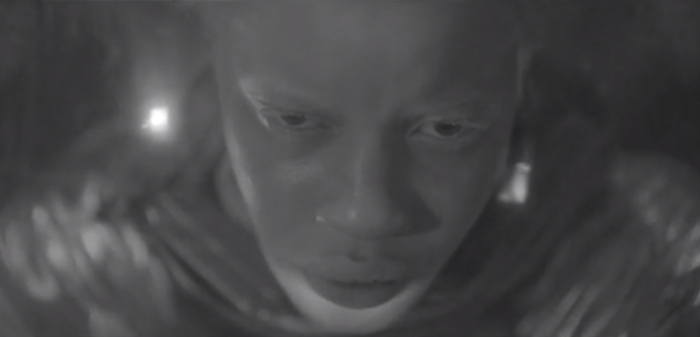From an alien abduction to nuclear space travel, sanity isn’t required in this flight plan
The films in “Shorts from Mars” are divided by geographic lines — intraplanetary ones, mind you — as both “Margaret Hue Would Like to Go to Mars” and “Atomic Dream” are among this year’s featured films in “Wisconsin’s Own.” There are at least two more divisions in the “Shorts from Mars” program too though, ones of personality and perspective that strangely enough, coincide with their programming order. Coincidence? Yeah, probably.
In “Margaret Hue,” director and Milwaukee Film Festival programmer Anna Sampers cuts together a fictional video essay where the title character (also played by Sampers) pitches her candidacy for a trip to the Red Planet. Cataloguing her interests, personality traits, and her, er, dog, Hue’s straight-faced diatribe plays more like a college application than a formality in space exploration, but lest you think this is all a touch ridiculous, Sampers later revealed that a real Mars expedition actually fielded candidates using such a method. After the program, Sampers also noted her affinity for using text-to-speech programs in her films as all of Margaret Hue’s dialogue is dubbed over with the broken cadence of a manufactured computer voice. The resulting stiff delivery bucks with the self-centered focus of her video pitch and invites more than a little humor in awkward mispronunciations. In her own words, Hue certainly seems like an interesting candidate and Sampers’ flat presentation accentuates that fact.
“Atomic Dream” also chooses a fascinating individual as the subject of its focus, albeit a real one. On the surface, (UW alum) Melanie Ruiz and Derek Lartaud’s documentary short outlines “Project Orion,” a program in the 1950s that (unsuccessfully) tried to launch a shuttle into space via atom bomb, but at the center of the defunct project and the film is British physicist Freeman Dyson. Despite recalling childhood memories filled with complex equations, Dyson never deems himself a wunderkind much less a genius, and his “outside the box” thinking seems to grow out of a contrarian personality and a disregard for convention. After all, wouldn’t one have to be a touch confrontational to devise such a plan? (For what it’s worth, Lartaud outed Dyson after the program as a climate change skeptic, too.) Clocking in at 25 minutes, “Atomic Dream’s” compact size helps keep its razor-sharp focus, even when it details Dyson’s confrontation with his own internal logic. From first viewing “Project Orion” as a benevolent alternative for nuclear technology, Dyson walks the viewer through his eventual support of the United Nations nuclear testing ban, though his reasons reveal an existing tension in the physicist between danger and scientific discovery — even in old age, he remains a renegade.
The limits of perspective divided the latter half of the program. In Frances Bodomo’s “Afronauts,” a crack team of Zambian astronauts try to beat the United States at their own game, spearheading a ramshackle lunar mission in the summer of 1969. Shot in gorgeous black and white, the moon launch in “Afronauts” doubles as an allegory for broader Civil Rights struggles as the film’s all black cast huddles in crowded tents, straining to hear pieces from the NASA radio broadcast. As the afronaut selected to man Team Zambia’s quest for one small step, Matha (Diandra Forrest) makes for a quiet, reluctant volunteer, and “Afronauts” is pensive and reflective because it never strays far from Matha’s perspective — even against the din of her rowdier, cruder, and drunker colleagues. Matha is right to be scared. One need only cite Zambia’s ramshackle shuttle fashioned from scrap metal or the budget “space training” Matha receives in a charming early montage. “Afronauts” leaves the fate of its pilot open-ended but gives Matha the last word, ending on an ambiguous note that suggests either a realized goal or inner peace at long last.
The Swedish language “Syndromeda” also enjoys using perspective to cloud reality, though it does so with far more bloody, naked butts than any other film in the program. When a man comes to in the middle of the wilderness, he’s naked and covered in blood with strange marks on his chest. Leif’s only logical conclusion? Alien abduction. Patrik Eklund begins in medias res on a tense note, but his tonal shifts from insanity to bleak comedy buttress the confusion of his lead. Eklund dodges definitive answers with Leif’s imagined memories of his abduction and like “Afronauts,” a final note that sticks diegesis and the character’s mind in a blender and presses “puree.” The conspiracy floodgates open when Leif visits an alien abduction support group and the crackpots come out to play, but who’s he fooling by walking out mid-meeting? Like the rest of the personalities in “Shorts from Mars,” sanity isn’t required in this flight plan.

